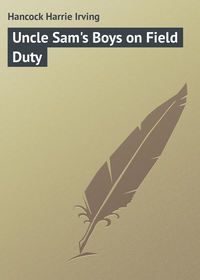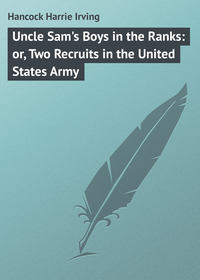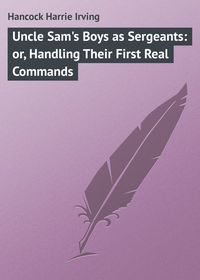 полная версия
полная версияDave Darrin and the German Submarines. Or, Making a Clean-up of the Hun Sea Monsters
A young naval petty officer standing just behind the bow gun wheeled abruptly, eyeing the soldier lot.
“Don’t you fellows get nervous,” he said. “This is my seventh trip across on a troopship, and to date the only thing I’ve seen to shoot at is the barrel that is chucked overboard when we’re to have target practice.”
“Who’s nervous?” demanded Pete.
“All of you,” replied the bluejacket calmly.
“Don’t you believe it!”
“That is not calling you cowards, either,” the bluejacket continued. “And let me give you a tip. If we’re still afloat when daylight comes, don’t any of you strain your eyesight looking for submarine conning towers sticking above the water. There won’t be any. No matter how many subs there may be about, they know better than to expose themselves with so many destroyers around and all the troopships armed. The most that any Hun submarine commander would show would be a foot of slim periscope for a few seconds, and it would be so far away that no one but a fellow used to looking for such things would see it. Want my advice?”
“If it’s any good,” nodded the corporal.
“It’s as good as can be had,” retorted the young bluejacket. “Here is the line of thought for you. Unless you’re detailed for guard or lookout duty, don’t bother looking for subs at all. Don’t even give any thought to them unless the attack starts. Keeping your mind off submarines will give you a better show to keep your hair from turning gray before you reach the trenches.”
This troopship was one of the pair that led the fleet. A long double line of ships it was. Some of the vessels were of eight or nine thousand tons; others were smaller and still others much smaller. They moved in two lines that were widely separated, and even in the lines the intervals between ships looked long to a landsman. Ahead a torpedo boat destroyer of the United States Navy scurried briskly, often scooting off to one side of the course. Other destroyers were out to port or starboard, while one craft manned by vigilant officers and men brought up the rear of the long fleet.
Every now and then a destroyer, for no reason apparent to a landsman, darted between ships and took up a new post, or else turned and scurried back to its former relative position.
This fleet was the present ocean home of the One Hundred and Seventeenth Division, United States Army. On one of the ships the most important passenger was Major General Burton, division commander. On another troopship the “big man” was Brigadier General Quimby, commanding the Three Hundred and Twenty-second Infantry Brigade. Brigadier General Sefton’s Three Hundred and Twenty-first Infantry Brigade was also with the fleet, along with Brigadier General Strong’s brigade of one heavy field artillery regiment and two light field artillery batteries.
There were Engineers and Medical Corps units on the ships of this fleet, Quartermaster field transportation units, Signal Corps men, and units of various other auxiliary branches of the service. First and last, some twenty-four thousand officers and men of the Army. Some of the ships carried horses and mules, others tractors. Great quantities of ammunition of all types were carried by this fleet; stores of food and medicines, batteries of artillery, ambulances – in a word, all the vast quantities of equipment, ordnance, clothing and the other items that go to meet the demands of troops on foreign field service.
A really huge Armada it was, considering the actual number of fighting men that it carried. A dark, uncanny-looking fleet it was, too, with an air of stealth and secret enterprise that could not be dispelled. Nowhere on any of the troopships did a light glow that could, by any possibility, be seen by those aboard another craft. Visible lights had been forbidden from the very moment that the ships had set sail from American ports.
To this rule of no visible lights the sole exception, occasionally to be observed, was the use of the red, white and blue electric lights that sometimes glowed briefly from the yard-arms of the vessels. These lights, slangily called “blinkers,” convey necessary messages from one war craft to another at sea.
Nineteen thousand fighting men and some five thousand to serve them behind the fighting lines in France, were thus crossing the ocean, under dark skies, and with every ship in complete darkness. It was a weird sight, and Uncle Sam’s soldiers aboard these ships had not yet gotten over the wonder of it.
All through the fleet, conversations as to the probability of submarine attack on the morrow, or on succeeding days, were infrequent and brief. Hardly a soldier, however, was fooled by the absence of talk on the subject. Each soldier knew that he was thinking a good deal about the chances of the ship’s being torpedoed on the high seas, and he knew, too, that his comrades were thinking of the same thing.
At last the bugles through the fleet softly sounded the call to turn in. Nearly all of the men had remained up on deck this evening. Now they stole below, hurriedly making up their bunks, and as hurriedly undressing and getting in under the blankets before “taps” should sound.
And so the decks were left to the gun-crews, to the lookouts and the members of the guard posted there. Below, on the berth-decks, some of the soldiers slept little, if any, that night. Others went promptly and soundly asleep.
It was on this same night that Lieutenant-Commander Dave Darrin was presently obliged to put out of his mind, as far as possible, further thought of the supposed treachery of Seaman Jordan, for they were on their way to the rendezvous where they were to meet the troopship fleet.
Dan Dalzell, as executive officer, came in breezily, saluting briskly and giving his cheery report as to the results of his inspection:
“All secure, sir.”
Dave was on the bridge, with Lieutenant Briggs, when Ensign Phelps came to report that he had been unable to find any of the looked-for bottles in Jordan’s duffle-bag or other effects, or, for that matter, anywhere else.
“Very good, Mr. Phelps. Thank you. I recommend that, until your watch is called, you get all the sleep you can. To-morrow there may be no sleep for any of us.”
Later in the night cautious signals, “blinker” lights, were observed off the port quarter.
The “Logan,” comprehending, replied with her own “blinkers.” The two craft presently came closer, and after that kept each other company, for the destroyer “John Adams” was also bound for the rendezvous of the early morn.
Two hours before dawn Darrin gave the order to lie to. The “Adams” also stopped her engines, nearly, for the destroyers had reached the point of rendezvous. Soon afterward a third destroyer signalled and joined; not long after that a fourth. There were two more on hand before dawn.
Through the dark sky came three short, quick flashes of a searchlight. It was the “Logan” that returned this signal. Then other signals were swiftly exchanged with the craft to the westward.
“The troopship fleet is going to be punctual to the minute,” Darrin remarked to his watch officer.
“And our biggest time will be ahead of us, sir, I’m thinking,” responded Lieutenant Briggs.
“In a way the big time will be welcome,” smiled Dave. “Even if we are unfortunate enough to sustain some losses the Hun will get the worst of it.”
“Why do you say that, sir?” Briggs inquired.
“Because, so far, in every encounter with naval vessels or troopships the Hun has seemed fated to get the worst of it.”
In the east a pale light appeared in the sky. This slowly deepened. Then came the early red and orange tints of what promised to be a bright day.
“There’s the troopship fleet!” cried Darrin, joyously. “The head of it anyway. We’ll soon see more of it.”
Lieutenant Briggs held his glass for a full thirty seconds on the first ships visible to the westward.
“And there goes our signal to join!” exclaimed Darrin, as bunting broke from the foremast of the leading destroyer with the fleet. “Acknowledge the signal, Mr. Briggs, and give the order for full speed ahead.”
Racing westward went six torpedo boat destroyers to meet their comrades of the Navy and of the Army.
As they drew nearer, those on the destroyers could see a wild waving of hats by the soldiers crowding the decks of the leading transports. One moment the hat-waving was visible; then as suddenly it ceased, and the spar decks were nearly bare of men, for mess-call had sounded for breakfast. The only soldier who fails to answer mess call is a sick or a dead one.
“Follow second destroyer on port line,” came the signal from the leading destroyer to the “Logan.” “After taking position meet any emergency according to best judgment.”
So the “Logan” raced along to the north of the fleet, then made a swift, curving sweep and moved into the assigned position.
From the decks of the nearest transports, soldiers, as they returned from their meal, blithely waved their caps again. Cheering was forbidden, as such noise would drown out orders that might be given for the handling of the ship. But those Of Dave’s jackies who could, waved back good-humoredly.
For some minutes after taking position, Darrin found himself running along with the troopship “Cumberland,” and the distance between them was but a few hundred yards.
Dave had turned to watch the movements of the destroyer ahead in the line when he heard a starboard lookout call:
“Torpedo coming, sir, on the port beam!”
Like a flash Darrin wheeled to behold the oncoming trail.
Lieutenant Curtin, now on the bridge watch, gave quartermaster and engine-room swift orders, while Ensign Phelps signalled the “Cumberland.”
Like a racehorse in full career, the “Logan” bounded forward and made a sharp turn to port. At the same time the “Cumberland” obliqued sharply to starboard.
On came the torpedo. The soldiers on the troopship deck watched its course with fascinated eyes.
The “Logan,” having swerved enough only to clear the deadly missile, now darted in again, her nose striking what was left of the torpedo trail. On she dashed, gun and bomb crews grimly waiting, every man on duty alert on the destroyer’s decks.
Cutting the wind the “Logan” raced on her way, her bow throwing up a huge volume of water. Dave, on the bridge, saw his staunch little fighting craft near the starting end of the tell-tale torpedo trail. And there on the water, moving eastward and at right angles with the direction of the path, was an ill-defined, bulky something which, from the destroyer’s bridge, looked like a submerged shadow.
Quickly rasping out a change in the course, Dave saw the “Logan” overtake that shadow in a matter of seconds. The shadow was much less distinct now, for the sea pest was submerging to greater depth.
It was Darrin himself who seized the handle of the bridge telegraph.
Answering the signal sent by Dave to the engine room, the “Logan” made a magnificent leap forward just as the destroyer’s bow reached the point over the tail of the shadow.
“Let go the depth bomb!” he roared. The signal was passed to the bomb crew to “let go!”
Over went the bomb. The “Logan” still leaped forward.
Then, astern of the rushing craft, came a muffled roar. A great mass of water shot up into the air, like a compressed geyser. Before the column of water had had time to subside big bubbles of air came up in myriads and burst on the surface.
The instant after the explosion of the depth bomb, the “Logan” turned on the shortest axis possible, her propellers slowing down somewhat.
“The ‘Cumberland’ is still afloat and not hit, thank Heaven!” Darrin uttered fervently.
Only the troopship’s quick turn to starboard had saved her. The torpedo had sped past by less than five feet from her rudder.
Another turn, and Dave came up with the scene of the explosion. Oh, cheerful sight! The water was mottled with great patches of oil. More cheering still, sundered bits of wooden fittings from a submarine floated on the water. Two dead bodies also drifted on the swells; the remaining Huns on the shattered craft must have gone down with the sea pest.
“Not bad work, Mr. Curtin,” Dave remarked, calmly, as the destroyer once more moved into her place in the escort line.
“May we have as good luck every time,” came the fervent response of the watch officer.
Word of the bomb hit had been signalled along the line. It was hard indeed that the soldiers were not allowed to cheer!
But had the morning’s work really begun?
CHAPTER IX – WHEN THE ENEMY SCORED
The sun had risen through a haze, which is in favor of a fleet on the defensive, as there is not so much glare from the water to confuse the vision of lookouts.
However, there was no attack in the next hour. The fleet continued on its way only as swiftly as the slowest transport could move, for it is an axiom at sea that the speed of a fleet is the speed of its slowest ship.
Suddenly Dave recalled to mind the prisoner, Jordan, locked in the brig below.
“Corporal,” he called down, as that noncommissioned officer of marines passed across the deck, “in case we are hit and are sinking, make it your duty to remember Jordan, in the brig. Turn him loose before we abandon ship – if the day’s work comes to that.”
“Humph!” Pete was saying to his soldier comrades forward on one of the leading transports. “The Germans must be hard up when they can send only one sub to tackle a fleet like this.”
“I don’t care if the Huns send fifty or a hundred of their pests,” broke in another soldier. “The subs have no show. Did you see that destroyer? Scoot! Pouf! Hm! Where’s that submarine now? I tell you, fellows, after all, submarines are good only for sinking unarmed schooners.”
“Still, they’ve sunk more than a few armed steamers,” argued a comrade.
“If they did,” maintained the former speaker, warmly, “then it was because the lookouts and gunners were asleep. You wait! If we meet a dozen of these Hun submarines to-day you’ll find that they won’t get any of our ships.”
“I’m going to do my bragging after we land,” interjected an old sergeant dryly. “I always enjoy my bragging best after I get over my scare.”
But the long quiet proved too good to last. The almost simultaneous barking of guns from three troopships and from two destroyers called swift attention to the fact that the fusillade was aimed at a periscope off starboard. Nearly a dozen shells struck the water all around the spot where the periscope had vanished. From about the same point a light streak appeared on the water.
Signalling back instructions to the transports as to their course, a destroyer darted out of line to go after the submarine after the fashion that Darrin had employed. Ere long the destroyer swerved in a sharp curve and headed back for her place in the escort line, signalling at the same time:
“Nothing left for us to do. A shell from one of the guns engaged hit the pest under water and poured oil on the troubled waters.”
In the meantime, the endangered transport, which had promptly and intelligently obeyed the steering order, had barely escaped the torpedo fired at her.
Spirits now ran high in the troopship fleet. Uncle Sam’s soldiers had seen the threatened ships saved, and had also seen Uncle Sam’s sailors show how easily a submarine may be fought – sometimes.
After that the fleet proceeded on its uninterrupted way for so long a time that the noon meal had been eaten calmly by the voyaging soldiers. Few of them thought it worth while to cut that meal short in order to go on deck again.
Especially did Pete and his friends feel indifferent to the best that the Huns could do out here on the water. Just then there came a terrific shock. It was an explosion, followed by a crash that caused the ship to stagger over to starboard, though she quickly righted herself.
“They’ve got us!” yelled Pete, jumping up from the table, overturning his coffee and starting for the upper deck on a run.
Then, ashamed of his nervousness, Pete stopped running and tuned down to a slow walk toward the companionway stairs from the mess deck. Others were running, with a resulting jam on the stairs.
“What are we going to do?” one soldier asked Pete.
“Do the same thing that we’ve been doing ever since we came into the Service, I guess,” drawled Pete. “And that is, we’re going to listen and obey orders. Stop shoving, you fellows. We won’t get up any faster for crowding.”
Soon staff and line officers appeared at the head of the stairs, issuing sharp, steady commands that stopped all signs of a possible panic.
“Keep your wits, men, and the last of you will reach shore all right,” called an officer who was forcing his way down the stairs. “Some of you men turn aside and give me a chance to get to the deck below.”
His coolness, and his willingness to be on the mess deck calmed the excitement of many a young soldier who was eager to get up to the spar deck. From a deck rail in front of the chart-house a major with a lusty voice shouted down:
“No excitement, men! This ship, if she sinks, will be a long time doing it. There will be time to get every man off, and it will be done if you listen to orders and obey them.”
That torpedo had struck deep into the ship’s vitals, stopping the engines instantly.
Only here and there was there a soldier who did not have his life belt on. These now scrambled for their belts.
From the flagship of the destroyers at the head of the line swift signals were wigwagged and repeated down the lines. One of them read:
“‘Logan’ stand by ‘Castle City’ for rescue work.”
Instantly Dave ordered the full-speed signal telegraphed to the engine room, then added, as the destroyer raced down the line:
“Keep all gunners and lookouts at their stations, Mr. Dalzell. Mr. Briggs will take charge of manning and lowering our two launches and the cutters, and will stand by to lower away.”
The destroyer “Adams” had already caught a hawse-line from the “Castle City” by the time Dave’s craft reached the scene. With the hawser made fast the destroyer was towing the stricken transport out of the fleet line.
“Lower away,” Dave commanded, after he had dashed past the “Castle City” and had lain to. Overboard went the launches and cutters, and Lieutenant Briggs was soon alongside the transport, which was also lowering well-filled lifeboats.
His own boats and the ship’s boats Briggs had towed in strings. On orders from the commander of the destroyer flotilla, other troopships halted long enough to take on the rescued ones.
Still another destroyer had to hasten to the assistance of the “Logan,” for the “Castle City” was rapidly settling lower in the water.
Never had naval small craft worked at greater speed, yet necessity moved faster. The transport had by now heeled well over to port. She could not keep afloat much longer.
“Those who cannot get into the boats now will have to jump,” shouted Dave Darrin.
So excellent was the control by the regimental officers on the “Castle City” that even now there was no panic. Soldiers gathered at the points indicated, and sprang overboard when ordered to do so. The ship’s crew, too, were now jumping.
Among them crept the destroyer “Logan,” her sailors throwing lines, while a side gangway was also lowered for the use of those who could swim to it.
Scores of soldiers were soon on the “Logan’s” deck. These were directed to seek warm quarters below where they could dry their clothing. Many of the soldiers preferred to remain on deck to aid in the rescue of their comrades. Having cast off after finishing her job of towing, the “Adams” was now busy, too, in rescue work.
At last, when no more heads appeared on the water, and no more men were in evidence on the decks of the sinking transport, the order was signalled for the rescue-work destroyers to stand clear.
“She’ll plunge by the head within five minutes,” Dalzell declared, as the “Logan” steamed clear.
Bang! bang! bang! Destroyer and troopship guns, up near the head of the line, had suddenly begun blazing away.
Half a dozen periscopes showed short lengths, briefly, above the water, but the number of faint streaks across the sea showed that other enemy submarines were attacking without first taking periscope sights.
“It’s the general attack on the fleet, that we expected!” Dave Darrin shouted from the bridge. “Stand by! Remember that fractions of seconds count in carrying out orders now.”
Then Lieutenant Beatty caught sight of a periscope above the water, some eight hundred yards away. One of the “Logan’s” forward guns spoke in sharp challenge. The biggest submarine sea fight of all was now on!
CHAPTER X – THE HOTTEST WORK OF ALL
From the troopship line, as the “Logan” dashed away, Darrin could hear the guns of the transports that were coming up and near enough to take part in the fight. Wherever a periscope showed itself it was bound to invite fire from half a dozen gunners in almost the same instant.
“Sorry, but you soldiers will all have to go inside and remain there,” ordered Lieutenant Dan Dalzell. “We have no room for any one on deck except our crew.”
To most of the soldiers it seemed hard to be deprived of a view of the only thing that interested them, but Navy officers, in issuing orders, have a way of speaking that does not admit of doubt as to their meaning.
“There goes the ‘Castle City’ by the bow,” called a lookout, but Dave Darrin, his eyes searching for a torpedo trail, took his word for it and did not turn to look.
“Torpedo wake, sir, three points off port bow!” sang out a lookout.
Dave turned this time; the telltale line was there. His orders rapped out and the “Logan” started by the shortest cut to reach that line and to locate its source.
Even as they raced to find that submarine, a gunner on the “Logan” fired at the briefly visible periscope of another enemy craft.
Suddenly, not more than two hundred yards away, a periscope reared itself in their path, though not more than two feet of its length appeared above the water.
Intensely alert, Lieutenant Beatty himself sighted and gave the order to fire. Nor was this an easy task, for the destroyer, to avoid ramming and ripping out part of its own hull, veered aside from the direct line.
“Fire!” yelled Beatty.
The shell gave a good report of itself. It was plain that it had made a hit of some sort, though below the surface.
The destroyer swung again to face its prey. Higher came the periscope, then the conning tower emerged. It was then observed that the conning tower had been struck and a hole put through it on one side. Small though the hole was, if the craft had submerged further instead of rising, she would have been submerged for all time.
Lieutenant Beatty calmly sighted for the next shot. Just as the deck of the undersea boat came awash the manhole sprang open and the heads of two German sailors appeared.
“They’re going to try to man a gun and fight us,” Darrin concluded, swiftly.
“Fire!” ordered Beatty, calmly.
That shot could not have been better placed. It struck the tower fairly, exploding inside. It killed both men at the manhole, hurling them into the sea. Probably it killed the officer in the conning tower as well.
Beatty did not stop here. Another shell had been loaded in at the breech of the gun, and he bent forward to sight just as the upper part of the hull came into view.
“Fire!” It was a clean hit, just at the water line. Hardly an instant later, it seemed, the same gun spoke again – another water-line hit.
“Bye-bye!” murmured Dave, as he ordered the course changed. There was no need to wait, or to plant another shot, for the inrush of water had settled the fate of that submarine so speedily that there wasn’t the slightest chance for any of the Huns to save themselves. That pest settled quickly, then disappeared from view.
“Clean work – great, Mr. Beatty!” Dave called down briskly.
Mr. Beatty, though he acknowledged the compliment with a salute, did not turn to look at his superior, as prescribed by regulations, for his keen, swift glance was sweeping over the waters ahead.
And not more than a hundred yards ahead of them a faint “wake” crossed their bow, headed for one of the ships of the transport fleet. Instantly the “Logan” turned into that trail, following it back at racing speed.
It looked like Dave Darrin’s lucky day, for they plunged over the dark, heavy shadow of something that was not far below the surface.









